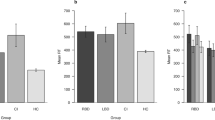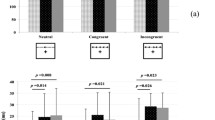Summary
Simple reaction times (RT) to clicks, flashes and numerical signals were measured in four groups of subjects: 21 patients with mild presenile onset dementia of the Alzheimer type (PDAT, mean age 56 years), 14 patients with chronic cardiovascular disease and incipient cognitive deficit (mean age 55 years), 15 healthy older controls (mean age 53 years) and 16 younger controls (mean age 23 years). Both patient groups had significantly prolonged RTs, the PDAT group especially to the numerical signal (149%), compared with the age-matched controls.
Similar content being viewed by others
References
American Psychiatric Association (1987) Diagnostic and Statistical Manual of Mental Disorders, 3rd edn. American Psychiatric Association, Washington, pp 103–109, 119–123
Bellis CJ (1933) Reaction time and chronological age. Proc Soc Exp Biol Med 30:801–803
Berg L, Hughes CP, Coben LA, Danziger WL, Martin RL, Knesevich J (1982) Mild senile dementia of Alzheimer type (SDAT): research diagnostic criteria, recruitment, and description of a study population. J Neurol Neurosurg Psychiatry 45:962–968
Burke WJ, Miller JP, Rubin EH, Morris JC, Lawrence AC, Duchek J, Wittels IG, Berg L (1988) Reliability of the Washington University Clinical Dementia Rating. Arch Neurol 45: 31–32
Elsass P, Hartelius H (1985) Reaction times and brain disease: relations to location, etiology and progression of cerebral dysfunction. Acta Neurol Scand 71:11–19
Hellström A, Forssell LG, Fernaeus SE (1989) Early stages of late onset Alzheimer's disease. V. Psychometric evaluation of perceptual/cognitive processes. Acta Neurol Scand 79 [Suppl 121]:87–92
Hughes CP, Berg L, Danziger WL, Coben LA, Martin RL (1982) A new clinical scale for the staging of dementia. Br J Psychiatry 140:566–572
Klensch H (1973) Die diagnosische Valenz der Reaktionszeitmessung bei verschiedenen zerebralen Erkrankungen. Fortschr Neutrol Psychiatr 41:575–581
Loring DW, Largen JW (1985) Neuropsychological patterns of presenile and senile dementia of the Alzheimer type. Neuropsychologia 23:351–357.
Mas JL, Alperovitch A, Derouesne C (1987) Epidèmiologie de la dèmence de type Alzheimer. Rev Neurol (Paris) 143:161–171
Müller G, Richter RA, Weisbrod S, Klingberg F (1990) Labyrinth learning impairment in patients with early symptoms of presenile dementia. Gerontology 36:145–149
Nettelbeck T (1980) Factors affecting reaction time: mental retardation, brain damage and other psychopathologies. In: Welford AT (ed) Reaction times. Academic Press, London, pp 355–401
Pirozzolo F, Christensen K, Ogle K, Hansch E, Thompson W (1981) Simple and choice reaction time in dementia: clinical implications. Neurobiol Aging 2:113–117
Pöthig D, Roth N (1980) Zum Einsatz von psychomotorischen Verfahren bei der Bestimmung des biologischen Alterns. Z Alternsforsch, 35:221–229
Pöthig D, Poegelt B, Roth N (1985) Zur Anwendung des La, byrinthtestes in der gerontologischen Funktionsdiagnostik. Z Alternsforsch 40:23–28
Rüsch J (1944) Dark adapatation, negative after images, tachistoscopic examinations and reaction time after head injuries. J Neurosurg 1:243–251
Tartaglione A, Bino G, Manzino U (1986) Simple reaction time changes in patients with unilateral brain damage. Neuropsychologia 24:649–658
Van Zomeren AH (1981) Reaction time and attention after closed head injury Swets and Zeitlinger, Lisse
Wagner O (1985) Möglichkeiten und Probleme der testpsychologischen Erfssung dementieller Syndrome im mittleren und höheren Lebensalter. Schweiz Arch Neurol Neurochir Psychiatr 136:43–45
Author information
Authors and Affiliations
Rights and permissions
About this article
Cite this article
Müller, G., Richter, R.A., Weisbrod, S. et al. Reaction time prolongation in the early stage of presenile onset Alzheimer's disease. Eur Arch Psychiatry Clin Nuerosci 241, 46–48 (1991). https://doi.org/10.1007/BF02193754
Issue Date:
DOI: https://doi.org/10.1007/BF02193754




